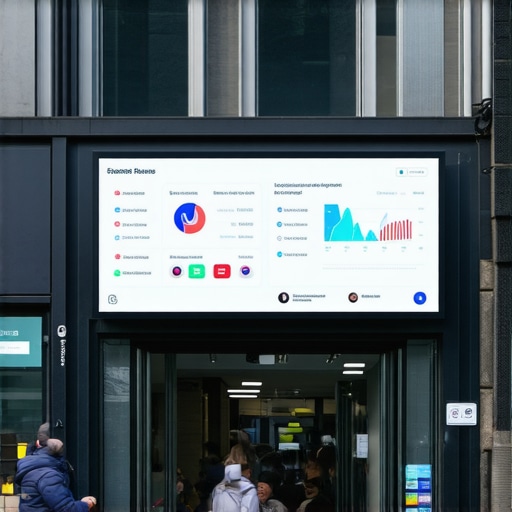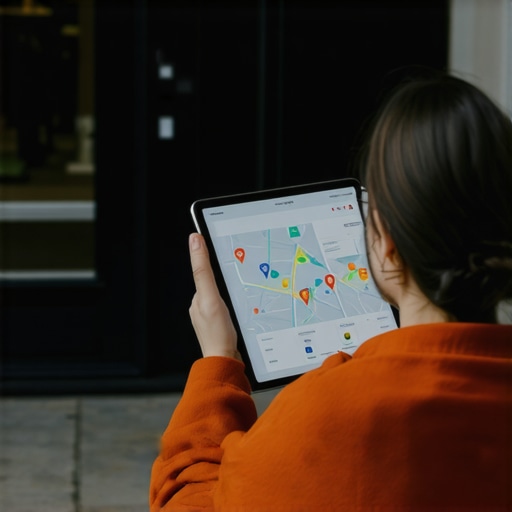The Local SEO Race: Are You Playing to Win or Just Running in Circles?
If you’ve ever wondered why some local businesses seem to dominate Google Maps while others struggle to get noticed, you’re not alone. I’ve seen countless entrepreneurs pour money into ads and fancy websites, only to discover that their Google My Business (GMB) profile remains a ghost town. Well, buckle up, because today I’m diving into the nitty-gritty of GMB optimization strategies that can turn your local search game from a sleepy crawl into a turbocharged sprint.
Why GMB Is the Unsung Hero of Local SEO – And How to Use It
Let’s face it, in the digital age, your business’s online presence is everything. Your GMB profile isn’t just a listing; it’s your storefront on Google’s digital street. When optimized properly, it’s like having a neon sign that says “Hey, we’re here, and we’re awesome!” But how do you make sure your profile isn’t just floating in the digital ether?
Strategies That Pack a Punch: From Zero to Local Hero
Are You Missing the Hidden Gems in Your GMB Profile?
First, claim and verify your listing — sounds simple, right? But many overlook the importance of filling out every detail meticulously. Think of your GMB profile as a personal resume: the more complete and appealing, the better your chances of standing out. Add high-quality photos, update your hours, and don’t forget the compelling description filled with local keywords. Remember, Google loves fresh content, so regularly update your profile with news, offers, and events.
Local Keywords and Customer Engagement: The Dynamic Duo
Incorporate local SEO keywords naturally into your profile. Use phrases like “best pizza near me” or “top roofing company in Brooklyn.” But don’t just stuff keywords—engage your community by responding to reviews, posting updates, and answering questions. This interaction boosts your credibility and signals to Google that your business is active and trustworthy. According to Moz’s local SEO guide, consistent engagement is a key ranking factor.
Is Your GMB Profile the Customer Magnet It Should Be?
Consider adding attributes, services, and FAQs that address common customer queries. The more helpful information you provide, the more likely potential clients will convert. And remember, an active profile attracts more reviews, which are gold in the local SEO world. Encourage satisfied customers to share their experiences—genuine reviews significantly impact your rankings and reputation.
In sum, optimizing your GMB profile isn’t a one-and-done task; it’s an ongoing process that requires attention, creativity, and a bit of strategic thinking. Want to explore more about local SEO mastery? Dive into our cornerstone content here or check out related tips in our blog. Got a story of how GMB transformed your business? Share your insights in the comments below—let’s learn from each other’s wins and missteps!
Are You Leveraging the Full Potential of Your GMB Profile for Local SEO?
Imagine walking into a neighborhood coffee shop and being greeted by a friendly barista who immediately remembers your favorite drink. That personal touch is what an optimized Google My Business (GMB) profile can do for your local SEO—creating a welcoming, memorable experience for potential customers. But are you truly maximizing this digital storefront, or are there hidden opportunities you’re missing?
Decoding the Algorithm: What Are the Hidden Signals in GMB Optimization?
Google’s local search algorithm is a complex beast, constantly evolving to prioritize relevance, distance, and prominence. While most business owners focus on basic profile completion, savvy marketers understand the importance of nuanced signals such as local backlinks, consistency in NAP (Name, Address, Phone number) data, and user engagement metrics. These elements work together to boost your visibility, but how can you systematically enhance them?
Can You Tap Into the Power of Local Community Engagement to Boost Your Rankings?
Absolutely. Engagement isn’t just about responding to reviews; it extends to participating in local events, sponsoring community initiatives, and sharing user-generated content. Such activities foster genuine relationships, which translate into authentic reviews and backlinks. According to a study by BrightLocal, businesses that actively engage with their community see a significant uptick in both reviews and local search rankings. Think of your GMB profile as a living entity—constantly growing and evolving with your community presence.
Optimizing Beyond Basics: Advanced GMB Strategies for the Discerning Marketer
To truly stand out, consider integrating schema markup for local businesses on your website, which helps Google understand your business context more precisely. Additionally, leveraging Google Posts to share timely updates, offers, and events keeps your profile fresh and engaging. Incorporate local keywords seamlessly into your descriptions and responses, but always prioritize clarity and authenticity over keyword stuffing.
Another often overlooked tactic is monitoring your GMB insights. These analytics reveal how customers find your profile, what actions they take, and which keywords drive traffic. Use this data to refine your strategies, focusing on what works best for your specific audience.
Is Your Business Ready for the Next Level of Local SEO Success?
The digital landscape is competitive, and standing out requires continuous adaptation and strategic thinking. Have you considered conducting a comprehensive GMB audit to identify gaps and opportunities? Or perhaps exploring advanced tools like Moz Local or BrightLocal’s suite to streamline your efforts? Remember, the most successful local businesses don’t just optimize once—they evolve and innovate.
If you’re eager to deepen your understanding, I invite you to explore our detailed guide on advanced GMB tactics. And if you’ve already experienced the transformative power of a well-optimized GMB profile, share your story below—your insights could inspire others to elevate their local SEO game!
Leveraging Local Schema Markup for Enhanced Visibility in Google Maps
One sophisticated method often overlooked by local businesses is the implementation of schema markup on their websites. Schema markup, a form of structured data, helps search engines better understand your business details, thereby improving your local search rankings. For instance, by embedding LocalBusiness schema, you provide Google with explicit information about your business name, address, phone number, and operating hours, which aligns with your GMB profile. According to Moz’s comprehensive guide on schema markup, this practice enhances rich snippets and improves click-through rates from local search results.
How Does Schema Markup Influence Local SEO Rankings?
Schema markup influences local SEO by reducing ambiguity and increasing the relevance signals sent to Google. When your website’s structured data aligns with your GMB profile, it creates a cohesive narrative that search algorithms favor. This synergy boosts your prominence in local packs, especially when combined with other signals like reviews, citations, and engagement metrics. Implementing schema markup is thus a strategic layer that complements your ongoing GMB optimization efforts, pushing your visibility from good to exceptional.
Harnessing Google Posts for Strategic Content Marketing
Another advanced tactic involves the proactive use of Google Posts. These are short, timely updates that appear directly within your GMB profile, serving as mini-campaigns or news briefs. By regularly publishing posts about upcoming events, special offers, or industry insights, you signal activity and relevance to Google. Moreover, well-crafted posts with local keywords can capture the attention of nearby searches, effectively turning your GMB profile into a dynamic content hub. A study by BrightLocal revealed that businesses utilizing Google Posts see a notable increase in profile engagement and customer inquiries, making this a must-have component of any expert-level local SEO strategy.
What Are the Best Practices for Creating Effective Google Posts?
Effective Google Posts are concise, engaging, and keyword-optimized without sacrificing authenticity. Use compelling calls-to-action, include high-quality images, and incorporate local keywords naturally. Remember, consistency is key: schedule regular updates and monitor engagement metrics to refine your messaging. Additionally, leverage UTM parameters in post links to track performance and ROI, ensuring your efforts translate into tangible business results.
Utilizing GMB Insights for Data-Driven Optimization
While many focus on manual efforts, savvy marketers harness the power of GMB Insights to guide strategic decisions. These analytics reveal how users discover your profile, what actions they take, and which keywords are most effective. For example, if insights show a high volume of searches for a specific service, you might consider creating dedicated landing pages or tailored Google Posts to capitalize on that interest. Furthermore, tracking review trends and engagement patterns enables you to identify areas for improvement and capitalize on emerging opportunities. According to BrightLocal’s latest review survey, businesses that actively analyze and respond to insights outperform competitors in local visibility.
How Can You Integrate GMB Insights Into Your Overall SEO Strategy?
Integrating GMB insights involves establishing a feedback loop: analyze data regularly, adjust your content and engagement tactics accordingly, and measure impact. For instance, if certain keywords drive more profile visits, optimize your website content around those terms. Consistent insight-driven adjustments ensure your local SEO efforts remain agile and effective, especially in a competitive landscape.
Ready to elevate your local SEO with these advanced strategies? Dive deeper into our comprehensive guide here, and share your success stories or questions below — let’s push the boundaries of local search mastery together!
Deciphering the Nuances of Local Citations and Their Impact on GMB Authority
While many focus on optimizing their GMB profile itself, the often-underestimated power lies in the consistency and quality of local citations. These digital mentions across reputable directories and local platforms serve as external endorsements, bolstering your business’s prominence in local search results. According to Whitespark’s Local Citation Finder, high-quality citations with NAP (Name, Address, Phone) consistency significantly influence Google’s perception of your business’s credibility and relevance.
How Can You Strategically Cultivate Local Citations for Maximum Authority?
Developing a targeted citation building plan involves prioritizing authoritative directories aligned with your industry niche and geographic focus. Regular audits to identify and update outdated or inconsistent citations are crucial. Furthermore, leveraging industry-specific directories not only enhances citation volume but also improves referral traffic and local trust signals. Tools like Moz Local can streamline this process, ensuring your citations are uniform and optimized for search engines.

Harnessing the Power of User-Generated Content Beyond Reviews
Beyond reviews, user-generated content (UGC) such as photos, videos, and Q&A interactions can dramatically amplify your GMB profile’s authority. Encouraging patrons to upload their own photos or share their experiences creates a vibrant, authentic narrative that search algorithms favor. A case study by BrightLocal illustrates that profiles enriched with diverse UGC tend to rank higher and attract more engagement, reinforcing the importance of fostering community participation.
What Are the Best Tactics to Stimulate Genuine UGC That Boosts Local SEO?
Implementing campaigns that incentivize customers to share their experiences organically is key. For example, hosting local contests or featuring customer stories on your profile not only encourages participation but also signals active community involvement. Additionally, responding to UGC with personalized comments demonstrates engagement, further enhancing your profile’s trustworthiness and relevance in Google’s eyes.
Integrating Voice Search Optimization into Your Local SEO Strategy
With the surge of voice-activated searches, optimizing for voice queries has become a sophisticated layer of local SEO. Voice searches tend to be conversational and question-based, demanding a shift in keyword strategy. Incorporating natural language and long-tail question phrases—such as “Where can I find the best Italian restaurant near me?”—aligns your content with voice search patterns. Google’s BERT algorithm update emphasizes understanding intent, making this adaptation vital for staying top of local search results.
How Can You Reconfigure Your Content for Better Voice Search Compatibility?
Start by auditing your existing content for conversational keywords and question-based phrases. Structuring your website’s FAQ section to match common voice queries enhances your chances of being featured in voice snippets. Moreover, ensuring your GMB profile includes clear, concise responses to typical customer questions further improves your chances of capturing voice search traffic, ultimately expanding your local visibility.
Expert Insights & Advanced Considerations
1. Master the Art of Local Authority Building
Beyond optimizing your GMB profile, cultivating local authority through strategic partnerships, sponsorships, and community involvement can significantly enhance your prominence. Building relationships with local influencers and participating in regional events foster trust and generate valuable backlinks, elevating your local search rankings.
2. Leverage Structured Data for Richer Search Results
Implementing schema markup on your website, especially LocalBusiness schema, not only improves how your data appears in search snippets but also signals relevance and trustworthiness to Google. This advanced tactic can differentiate your listing in competitive local packs, driving higher click-through rates.
3. Utilize Advanced Content Strategies in Google Posts
Develop hyper-local content themes for your Google Posts, such as neighborhood stories or local case studies, to engage nearby prospects. Incorporate multimedia and compelling calls-to-action to maximize engagement, which in turn boosts your profile’s visibility and authority.
4. Conduct Regular Local SEO Audits with Sophisticated Tools
Use comprehensive tools like Moz Local or BrightLocal for in-depth audits of citations, NAP consistency, and review profiles. Regular audits help identify gaps and maintain your profile’s integrity—crucial for sustaining top rankings amidst evolving algorithms.
5. Foster a Community-Centric Review Strategy
Encourage authentic reviews by engaging with your customers through personalized responses and community initiatives. Cultivating a loyal customer base that actively reviews your business signals credibility and can positively influence local search prominence.
Curated Expert Resources
- Moz Local: An authoritative platform for citation management, local audits, and schema implementation, trusted by SEO professionals for its comprehensive features.
- BrightLocal’s Local Search Resources: Offers detailed guides, case studies, and tools focused on local SEO mastery, including review and citation strategies.
- Google’s Official Business Blog: The primary source for updates on GMB features, algorithm changes, and best practices directly from Google.
- Whitespark’s Citation Finder: A specialized tool for discovering authoritative citation opportunities and ensuring NAP consistency across platforms.
- Schema.org Documentation: The definitive resource for implementing structured data that enhances your local search presence.
Final Expert Perspective
Harnessing the full potential of your Google My Business profile in local SEO requires a blend of technical mastery, strategic community engagement, and continuous optimization. As search algorithms evolve, staying ahead means adopting a proactive, data-driven approach that integrates advanced tactics like schema markup, authoritative citation building, and sophisticated content strategies. Remember, in the competitive landscape of local search, your profile isn’t just a listing—it’s your digital storefront, your community hub, and your strategic asset. Dive deep into these insights, experiment boldly, and contribute your expertise—together, we advance the art and science of local SEO to new heights.
,




This post offers a comprehensive overview of the many facets involved in optimizing a GMB profile for local search. From my own experience managing local listings, I can attest that consistent engagement—not just filling out all the details—really makes a difference in building trust and authority. I’ve seen businesses improve their rankings simply by actively responding to reviews and posting regular updates, which aligns with the article’s emphasis on community involvement. I’m especially intrigued by the advanced tactics like schema markup and voice search optimization. Has anyone found effective ways to implement schema on their website without it becoming overly complex? Also, with the rise of voice search, I wonder how much content we should tailor specifically for voice queries versus traditional text.
This post really hits home about the importance of continuous GMB optimization—it’s not a set-it-and-forget-it deal. I’ve personally seen how adding rich, localized content regularly can boost visibility significantly. During my recent campaign, leveraging Google Posts and updating FAQs with natural language keywords led to noticeable improvements in nearby searches. One thing I’ve been exploring is integrating voice search keywords organically into GMB posts and descriptions, which seems to further boost engagement, especially with the rise of smart speaker usage. Has anyone tried customizing their GMB profile specifically for voice search queries? I’m curious whether focusing on conversational phrases has a measurable impact on rankings or customer inquiries. Plus, I’d love to hear about creative ways you’ve used UGC to boost local authority—sometimes a simple photo contest can drive a lot of authentic engagement that Google translates into higher rankings. Any tips or experiences to share? It’s thrilling to see all these advanced tactics coming together to elevate local SEO efforts.
This article really underscores the ongoing effort needed in GMB optimization. I’ve noticed that implementing local schema markup on my website made a noticeable difference in how my business shows up in search results, especially in local packs. It’s an advanced tactic but worth the effort for better visibility. I’m curious, for those who have tried this—what’s been your experience with integrating schema without overcomplicating your site? Also, I’ve been experimenting with Google Posts to keep my profile lively. Regular updates with local keywords seem to attract more inquiries—has anyone found a particular content type or format that works best? I’d love to hear how others are blending these strategies with their overall marketing efforts to stay ahead in the local SEO game.